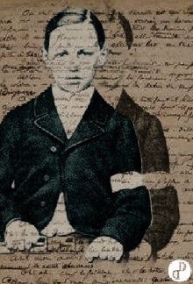by
Daulton Dickey.
One of the archetypes of les enfants terribles of the arts, seemingly devoid of impulse control, young Arthur Rimbaud exhibited vice, vileness, debauchery, and madness. All for his art: like the greatest artists, he defined his persona and translated it into his work.
 An intelligent child, he turned his attention to poetry, trying to inhabit it, to re-create the world. He seemingly wanted to reify a form of art in the shape of a person, who could, in turn, reproduce the experience of his inhabitation in the form of poetry.
An intelligent child, he turned his attention to poetry, trying to inhabit it, to re-create the world. He seemingly wanted to reify a form of art in the shape of a person, who could, in turn, reproduce the experience of his inhabitation in the form of poetry.
After nourishing and growing his skills and abilities, Rimbaud seemed dissatisfied with simply reading poetry and composing poems in his bedroom. He wanted to marry poetry with life. Through such a union he hoped to transcend the behavior inculcated by society.
But he also wanted more: to cocoon the boy and force the emergence of the seer. Through his poetry, he aspired to change reality itself. He aimed to attain the level of Voyant. Greater than a seer, the voyant, for which there is no English equivalent, is something like a combination between a visionary, a person capable of altering the world and its concomitant logic.
History has preserved his prescription for such a task as one of his most memorable and important pieces of writing. An excerpt from a letter written to a teacher, an early mentor, Rimbaud wrote the following:
“A poet makes himself a visionary through a long, boundless, and systematized disorganization [sometimes translated as “derangement”] of all the senses. All forms of love, of suffering, of madness; he searches himself, he exhausts within himself all poisons, and preserves their quintessences. Unspeakable torment, where he will need the greatest faith, a superhuman strength, where he becomes all men the great invalid, the great criminal, the great accursed–and the Supreme Scientist! For he attains the unknown! Because he has cultivated his soul, already rich, more than anyone! He attains the unknown, and if, demented, he finally loses the understanding of his visions, he will at least have seen them! So what if he is destroyed in his ecstatic flight through things unheard of, unnameable: other horrible workers will come; they will begin at the horizons where the first one has fallen!”
He aimed to initiate an internal and an external revolution—and to channel it into his art. Some commentators write off his ambition as the fruits of childhood, the product of a teen stranded between the child and the man. Such an interpretation condescends to the spirit of Rimbaud, and it also undermines the ambitions—and successes—of numerous artists and mystics throughout the centuries.
Great and useful artists train themselves to experience “reality” differently than other people. Those who don’t possess such aspirations offer nothing to anyone; they revel only in masturbation—creative onanism, so to speak.
In his early poems, written before he was sixteen, you can sense boredom with reality and an ambition to tweak or alter it. Poems such as “Poets, Age Seven” and “The Sideboard” illustrate the young poet’s desire to alter his experience of the world—and the early stages of the result of his desire.
 He broke with tradition, with cultural norms, by acting out against them. Eventually, he’d leave his provincial town of Charleville and heads to Paris. There, he defined himself by his aversion to norms: dirty in appearance and imagination, he’d brag about lice or his torrid affairs with other men—a bold thing to admit in public. Both active and passive sodomy was punishable by prison. By admitting such an act in public, at a bar, Rimbaud risked prison. But he also announced, to anyone who would listen, his rejection of the tyranny of social norms.
He broke with tradition, with cultural norms, by acting out against them. Eventually, he’d leave his provincial town of Charleville and heads to Paris. There, he defined himself by his aversion to norms: dirty in appearance and imagination, he’d brag about lice or his torrid affairs with other men—a bold thing to admit in public. Both active and passive sodomy was punishable by prison. By admitting such an act in public, at a bar, Rimbaud risked prison. But he also announced, to anyone who would listen, his rejection of the tyranny of social norms.
As he changed, so did his poetry. While careful to admit to such acts on paper, Rimbaud described a panoply of then-obscene desires and acts.
Bold and inventive, experimental and sophisticated, his broke the rules—social and literary—while creating his poetry. He had an affair with a married man, the poet Paul Verlaine, he behaved like a monster, getting into at least one knife fight, and he introduced free verse to French literature.
In the end, what he saw and what he experienced overwhelmed him. He escaped his anti-social tendencies by embracing some core values of the society he once abhorred. He lived for more than a decade after he abandoned his visionary quest—without writing a word of poetry. As he abandoned his worldview, he relegated poetry to the ash heap of his desires.

Daulton Dickey lives with his wife, kids, and pet human-lizard hybrid in a universe he created. He’s the author of Elegiac Machinations, Bastard Virtues, and Flesh Made World, Contact him at lostitfunhouse [at] gmail [dot] com
